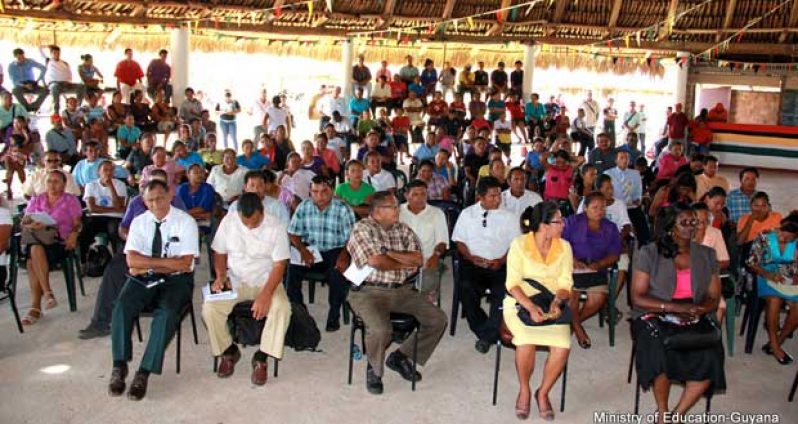–during consultations on Hinterland Education Improvement Programmme
IN light of the many achievements in the access to education and teacher training in the Hinterland, the Ministry of Education came to realise that more emphasis needed to be placed on the quality of education delivered in the Hinterland as a whole, with specific attention being paid to learning outcomes. As such, the Hinterland Education Improvement Programme (HEIP) was formulated to determine the gaps that exist in providing quality education and good learning outcomes.

The Ministry of Education is currently in the conceptualisation and preparation phase, which sees the involvement of all schools across all levels in the Hinterland and Riverine communities.
The MoE is of the view that consulting with the key stakeholders at all levels is an important and integral step in the planning process of this programme. As such, the Ministry commenced a number of consultations, with a grand launch of the HEIP in Lethem on Monday, June 9, 2014.

In Lethem, villagers generally welcomed the Hinterland Education Improvement Programme, noting their appreciation that HEIP will provide the necessary resources, teachers required to be more effective in the classroom, and that teacher capacity will improve through the training programmes they will be exposed to.
Residents also used the opportunity to communicate some concerns they have about the provision and delivery of education there, such as the need to design and implement parental education programmes, which can be done through home visits and public meetings.
Another concern of theirs was that the Learning Channel is not accessible in St. Ignatius, but only in Lethem. Other issues raised included the need for more materials to support teachers training programmes; the need for additional space at various schools to accommodate the growing population; the need for adequate electricity to be able to effectively implement the IRI Programme; and the fact that teachers are not utilising materials in the way they were intended.

Residents also expressed concern about the current curricula not catering for the local context. For example, in social studies, cattle rearing was one of the main economic activity of this region, it is not the case today. Gold mining is the main economic activity.
In addition to this, residents also made a list of recommendations to the Ministry, ones that they perceive would be of more benefit to them and their children. Among the recommendations were specific strategies to address the curriculum. It was suggested that Hinterland teachers be part of the curriculum revision/review process; they should also be included in the marking of NGSA and other national assessments. Another recommendation was that the curriculum should be aligned with examinations/assessment taking into consideration local context of the various hinterland communities.
They also called on the Ministry of Education (MOE) to institutionalise Adult Education programmes in Region 9, and expressed the need for more supervision; parental support; Guidance & Counselling programmes.
Residents requested the introduction of Portuguese at the Primary Level in the Region, and the implementation of programme for teenage girls on teenage pregnancy and its impact on their reproductive health.
The Hinterland Education Improvement Project (HEIP) consists of five components, namely: Improving the quality of Teacher Education in the Hinterland; Aligning Teaching-Learning Resources to Improve Students’ Outcomes; Improving Physical Facilities; Fostering Community Alliances; and Strengthening Management and Supervision in the Hinterland



.jpg)








